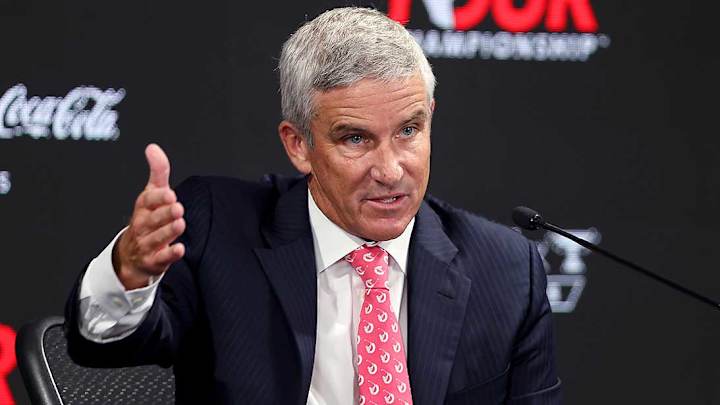Where the PGA Tour Is Going Is More Important Than the Journeys of the Commissioner's Private Jet

When General Electric was under siege from shareholders in 2017, it came out that GE CEO Jeffrey Immelt traveled the world on a corporate jet, with a second empty jet following in case of mechanical or security issues.
Of course, GE at the time was much larger than its $74.2 billion valuation of 2021, when it owned many subsidiaries that have been sold off or spun off into separate companies.
No matter how large GE was in the 16-plus years of Immelt’s tenure, no one believed that the two-plane scenario made much sense and was worth the expense.
Even GE tried to keep the two-jet practice quiet, including parking the two planes far away from each other and not letting the crews spend time together.
So, when I read the recent Wall Street Journal article about PGA Tour Commissioner Jay Monahan using a private jet, for both private and personal use, I say, "OK, so what?"
He wasn’t using two at the same time?
And while I liked seeing where Monahan had taken the Tour’s Citation X since becoming commissioner in 2017, including Montana, Nantucket, and St. Lucia to name a few, I again wonder what’s the big deal?
Like other commissioners such as Major League Baseball's Rob Manfred and the NFL's Roger Goodell, they are all running multi-billion-dollar organizations and their time is literally worth money — in some cases, a lot of money.
Should Monahan tell the CEO of Company X that wants to sponsor a PGA Tour event for the next 10 years at a price tag of over $100 million dollars that he can’t get to wherever they want to meet because he has to catch a commercial flight from Steamboat Springs, where he is vacationing with his wife, to Denver and then jump another commercial plane to fly to the meeting?
Or does it sound more professional that Monahan can just say he will be there in two hours using the Tour’s private jet?
While this isn’t how many people live their lives, it’s how things work in the upper echelons of business in this country, and the PGA Tour is big business.
The WSJ story challenges the PGA Tour’s financial management, as it’s crying poor in its competition with LIV Golf, funded by the $620 billion Public Investment Fund (PIF), the sovereign wealth fund of Saudi Arabia. (For the record, the $620 billion is a very fluid number going up and down depending on its extensive investments in and outside of Saudi Arabia.)
While it doesn’t seem like David against Goliath, the Tour for the first time faces a significant challenge, with LIV Golf and money the only currency many professional golfers appear interested in.
So, looking at the Tour’s expenses and how they use their money—an issue that Phil Mickelson harped on endlessly—is certainly fair game, but nitpicking flights on the private jet, which according to the article Monahan is mandated by the board to fly for both business and personal use, seems a bit extreme.
Calling out his salary of $14.2 million in 2020 again seems petty when you look at the salaries of Manfred at $17.5 million and Goodell at $63.9 million. NBA commissioner Adam Silver and NHL commissioner Gary Bettman each make $10 million annually.
The difference between the commissioners above and Monahan is that Monahan must deal with 200-plus shareholders and over 100 companies that are sponsors or affiliated with the PGA Tour and its ancillary tours.
It is easy to look at some decisions and shake your head, like at the Tour's new $81 million headquarters, desperately needed when the first shovel of dirt was turned in 2019 but before a global pandemic that has changed everyone’s thinking on large offices and headquarters.
Or paying its staff generously, including Tim Finchem, its retired commissioner.
If you follow the game long enough, you understand the value Finchem brought to the PGA Tour. How much it grew and how he protected it.
When the financial crisis was in full bloom in 2008-09, Finchem did some of the best tapdancing ever seen to keep current sponsors in the fold and even adding new ones.
Whether it means he deserves large payments after his tenure is really a board call, and it seems the board believed it made sense.
Jay Monahan was wrong when he said in a press conference at the Travelers Championship in June, "I am not naive. If this is an arms race, and if the only weapons here are dollar bills, the PGA Tour ... can't compete with a foreign monarchy that is spending billions of dollars in an attempt to buy the game of golf."
It’s not an arms race and money is not the only weapon.
LIV Golf and the PIF are not trying to buy the game. If they were, they would never have placed numerous phone calls to the PGA Tour, asking to sit down and discuss a relationship.
Monahan is not overpaid, nor are his benefits of using the company jet extreme.
Mistakes have been made that have nothing to do with money or how its spent and that should be the focus going forward.
Monahan and the PGA Tour must at some point acknowledge LIV Golf and what it can be for the sport, and then move on with what they have been doing since Gardner Dickinson and Jack Nicklaus started the Tour: create lucrative playing opportunities for its members.
Eventually each side will find a way to coexist and golf journalists can get back to writing about birdies and bogeys versus the sovereign wealth fund of Saudi Arabia and where the commissioner flew the corporate jet.
Reader feedback is welcome at inbox@morningread.com and we may publish your letter (include your name and hometown). Click here to receive all the latest Morning Read news and commentary free in your inbox every morning.
